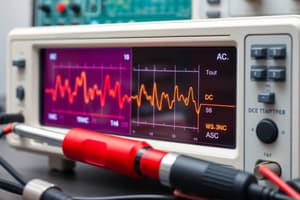Podcast
Questions and Answers
What is the primary source of gross error?
What is the primary source of gross error?
- Instrumental shortcomings
- Human mistakes in reading and recording (correct)
- Environmental effects on instrument
- Inherent limitations of the measurement method
How can instrumental errors be avoided?
How can instrumental errors be avoided?
- By minimizing environmental effects on instrument
- By selecting a suitable instrument for the particular measurement application (correct)
- By eliminating human mistakes in reading and recording
- By taking more than one reading of the same quantity
What is the main reason for environmental errors?
What is the main reason for environmental errors?
- Inherent limitations of the measurement method
- Human mistakes in using the instruments
- Instrumental shortcomings
- Environmental effects on instrument (correct)
What kind of errors can be avoided by using the proper correction factor and information supplied by the manufacturer of the instrument?
What kind of errors can be avoided by using the proper correction factor and information supplied by the manufacturer of the instrument?
What is the primary purpose of calibrating an instrument?
What is the primary purpose of calibrating an instrument?
What is the purpose of using mirrors or knife edged pointers in instruments?
What is the purpose of using mirrors or knife edged pointers in instruments?
What is the main difference between systematic errors and gross errors?
What is the main difference between systematic errors and gross errors?
What type of error occurs due to unknown causes, even when all systematic errors have been accounted for?
What type of error occurs due to unknown causes, even when all systematic errors have been accounted for?
What is the purpose of taking more than one reading of the same quantity?
What is the purpose of taking more than one reading of the same quantity?
What is the definition of absolute error?
What is the definition of absolute error?
What is the primary reason for classifying errors into different types?
What is the primary reason for classifying errors into different types?
What is the relative error?
What is the relative error?
What is the primary limitation of gross error?
What is the primary limitation of gross error?
What is the purpose of making a new calibration under local conditions?
What is the purpose of making a new calibration under local conditions?
What is the absolute error in the measurement of a voltage with a true value of 1.50 V and an indicated value of 1.46 V?
What is the absolute error in the measurement of a voltage with a true value of 1.50 V and an indicated value of 1.46 V?
What is a common source of observational error?
What is a common source of observational error?
What is the relative error in a measurement?
What is the relative error in a measurement?
What can be used to reduce observational errors?
What can be used to reduce observational errors?
A measurement instrument has a scale range of 0-2.50 V. If the true value is 1.50 V, what is the maximum absolute error possible?
A measurement instrument has a scale range of 0-2.50 V. If the true value is 1.50 V, what is the maximum absolute error possible?
What is the primary difference between systematic and random errors?
What is the primary difference between systematic and random errors?
What is the purpose of a concept map in understanding errors in measurement?
What is the purpose of a concept map in understanding errors in measurement?
What is the relationship between the absolute error and the relative error?
What is the relationship between the absolute error and the relative error?
Flashcards are hidden until you start studying
Study Notes
Types of Measurement Errors
- Errors occur due to human carelessness, instrument limitations, and environmental effects
- Classified into three types:
- Gross Errors
- Systematic Errors
- Random Errors
Gross Errors
- Occur due to human mistakes in reading, calculating, and recording data
- Can be minimized by:
- Taking care while reading and recording data
- Taking multiple readings of the same quantity by different persons
Systematic Errors
- Instrumental Errors:
- Due to inherent shortcomings in instruments and misuse of instruments
- Can be avoided by:
- Selecting a suitable instrument for the application
- Applying correction factors after determining instrumental error
- Calibrating instruments against a standard
- Environmental Errors:
- Arise from environmental effects on instruments (e.g. temperature, humidity, magnetic fields)
- Can be avoided by:
- Using correction factors and information supplied by the manufacturer
- Using arrangements that keep surrounding conditions constant
- Making new calibrations under local conditions
Observational Errors
- Occur due to carelessness of operators while taking readings
- Sources of observational errors:
- Parallax error while reading a meter
- Wrong scale selection
- Habits of individual observers
- Can be eliminated by using instruments with mirrors, knife-edged pointers, and digital display instruments
Random Errors
- Due to unknown causes, even after accounting for systematic errors
- Occur in high-accuracy work, due to:
- Friction in instrument movement
- Parallax errors between pointer and scale
- Mechanical vibrations
- Hysteresis in elastic members
Absolute and Relative Errors
- Absolute Error: difference between measured value and true value of a variable
- Relative Error: ratio of absolute error to true value of the quantity to be measured
Studying That Suits You
Use AI to generate personalized quizzes and flashcards to suit your learning preferences.




